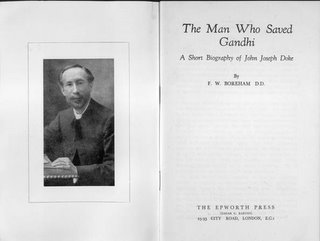 Nine times out of ten, before we rose from our chairs after these heart-to-heart talks, J.J.D. would strike a deeper note. How can a minister keep his soul in rapt communion with God? How can he inflame his personal devotion to his Saviour? How can he ensure the indwelling of the gracious Spirit? How can he prevent the evaporation of his early consecration, the fading of his youthful ideals? How can he keep his faith fresh, his passion burning, and his vision dear? When my companion turned to such topics, as he so often did, his eyes lit up, his soul shone in his face; he would lean forward in his chair in an ecstasy of fervour; he would talk like a man inspired.
Nine times out of ten, before we rose from our chairs after these heart-to-heart talks, J.J.D. would strike a deeper note. How can a minister keep his soul in rapt communion with God? How can he inflame his personal devotion to his Saviour? How can he ensure the indwelling of the gracious Spirit? How can he prevent the evaporation of his early consecration, the fading of his youthful ideals? How can he keep his faith fresh, his passion burning, and his vision dear? When my companion turned to such topics, as he so often did, his eyes lit up, his soul shone in his face; he would lean forward in his chair in an ecstasy of fervour; he would talk like a man inspired.For J.J.D. represented in his own person the most engaging and most lovable type of masculine saintliness of which I have ever had personal experience. He literally walked with God. He dwelt in the secret place of the Most High and abode under the shadow of the Almighty. God was never far away when he was near. To him the study of the Bible was a ceaseless revelry. During his earlier ministry he read it, from cover to cover, four times a year.
I recall a day on which the three of us‑the Mistress of the Manse, Mr. Doke and I‑had just finished afternoon tea on the lawn. We were still toying with our cups when a young fellow rode up on a bicycle. Taking me aside, he told me that Nellie Gillespie, a member of my young people's Bible class, was sinking fast: it was unlikely that she would last the night. As soon as the messenger had left, I explained the position to Mr. Doke, and begged him to excuse me. “Of course,” he replied, “but, first, come and sit here beside me.” He threw himself full length in the lounge chair, his body almost horizontal. “See,” he said, “I am Nellie Gillespie. I am just about to die. I have sent for you. What have you to say to me?”
Entering into the spirit of the thing, I leaned towards him and unfolded to him the deathless story that I shortly intended to pour into the cars of the real Nellie Gillespie. “Oh, my dear sir,” he moaned, “you're saying far too much. It's almost as bad as a theological lecture. Remember I'm utterly exhausted, months of languishing consumption ... I shall be gone in an hour or two. Make it very short and very simple.”
I began again, condensing into a few sentences all that I had said before. “Shorter still,” he demanded; “shorter and simpler! Remember, I'm dreadfully tired and weak. Shorter and simpler!”
I made a third venture, telling in just a word or two of the eternal Love and the eternal Cross. “Splendid!” he cried, springing suddenly to his feet and .clasping my hand. “Now away you go, as quickly as you can; and remember, whilst you are praying with Nellie Gillespie, I shall be praying for you! God bless you!” And the next day he assisted me at Nellie's funeral.
F W Boreham


